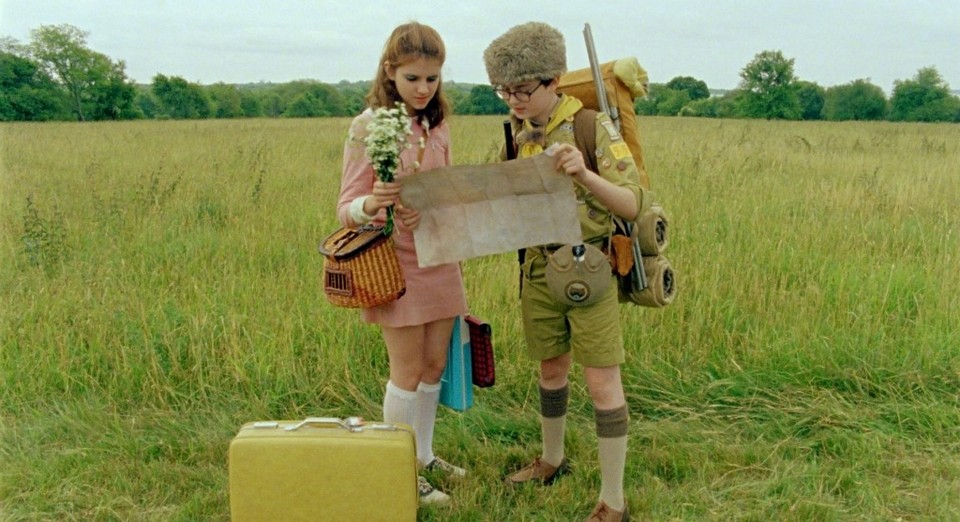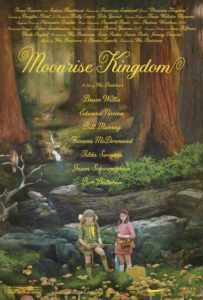Wes Anderson’s style may be getting as familiar as the faces that populate his films, which would only be a problem if it wasn’t magic every time.
[stextbox id=”grey” caption=”Moonrise Kingdom (2012)” float=”true” align=”right” width=”200″]
Director: Wes Anderson
Writer(s): Wes Anderson, Roman Coppola
Runtime: 94 minutes
Starring: Bill Murray, Bob Balaban, Bruce Willis, Edward Norton, Frances McDormand, Harvey Keitel, Jared Gilman, Jason Schwartzman, Kara Hayward, Tilda Swinton
Festival: Sydney Film Festival 2012
Distributor: Universal
Country: US
Rating (?): Highly Recommended
[/stextbox]
The seven films that Wes Anderson has released since Bottle Rocket (1996) have been nothing if not consistent. Few filmmakers of the last few decades, outside of the rut that Tim Burton is stuck in, have so consciously developed a distinctive way of telling a story as Anderson and his frequent collaborators. His deceptively whimsical explorations of youth and family have characterised The Royal Tenenbaums (2001) and Rushmore (1998), and in many ways Moonrise Kingdom sits somewhere in the middle. More accurately, it is a culmination of the themes he has been developing over the last sixteen years.
Anderson has always taken a retro and highly innocent view of American family life, and he and co-writer Roman Coppola directly imbue those qualities in newcomers Jared Gilman and Kara Hayward. Taking us back to 1965, our scene is set – thanks to an unnamed narrator, cartographer and historian (Bob Balaban) – on the fictional island of New Penzance, supposedly off the coast of New England. History, we are told, has a monster storm bearing down on the island, but the real tempest takes place over two days as boy scout Sam (Gilman) and Suzy (Hayward), a pair of socially awkward outcasts, decide to run away together. The action that follows is superficially much ado about nothing, but it belies a complexity familiar to all lovers of fairy tales.
After the kids run away together, the story shifts focus to the older characters and their crises. Anderson contrasts the purity of young love with relationships suffering under years of indifference, principally that of lawyers Walt and Laura Bishop (Bill Murray and Frances McDormand), Suzy’s parents. When island cop Captain Sharp (Bruce Willis) comes into regular contact with them, Laura’s dissatisfaction and indiscretions begin to come to the surface. Similarly, the disappearance of one of Scout Master Ward’s (Edward Norton) troops, and eventually his entire platoon, cracks his carefully ordered world. The actions of the kids are crazy and reckless, but not half as dysfunctional as the adults of New Penzance.
Moonrise Kingdom, like most of Anderson’s films, exist in a bubble of the past that never actually existed except in memory and dreamscapes. The music of Benjamin Britten pervades the unreal scenery, and Sam and Suzy first meet at a local production of Noye’s Fludde, in which Suzy plays a raven. Apart from recalling Rushmore, just as directly as the bespectacled clone Gilman does, Anderson is giving us an early signal that his film is about so much more than teenage love. Like the great flood, this tempest too shall pass, and with it comes renewal and a return to the innocence that Anderson and Coppola so vividly recall. Visually stunning, Moonrise Kingdom is an open love letter to youth of all ages.
Moonrise Kingdom played at the Sydney Film Festival in June 2012. It is released in US cinemas on 27 July 2012 from LD Distribution. It will be released in Australia by Universal.






